MK's Reading Life
Lifelong passionate reader. Mysteries, Fantasy, and Non-Fiction of various sorts. Currently reading a fair amount focused on WWI and the interwar years. (I have no idea why.)
Are you kidding me?

Sometimes you read a "great" or critically acclaimed book and all you can think is "What?!?! WHY?" This is a Pulitzer Prize winner, and I have no idea why. I will admit I was skeptical from the first. This is not my first post-apocalyptic book, movie or video game. And my response to the promos for the movie, was "Not again." But it is always unfair to judge a book by its movie, and there was that Pulitzer, so I thought I'd give it a go.
OK, the writing is excellent. The actual sentences, quite lovely. Think Faulkner or Hemmingway. It was that and the shortness of the book that kept me going. I may consider reading something else McCarthy has written.
But the story he puts together with those sentences is bleak, unoriginal and often just silly.
The world has ended in some unspecified all encompassing cataclysm 5-8 years before the events of the book. This is not the end of civilization or life as we know it, this is the end of life on earth. There are no living plants or animals. Not just on land, the oceans are dead as well. Not even the fungi seem to have survived. This is an all but complete sterilization of the planet. Except for people. People survived in great numbers, at least for a little while. No roaches or rats, but human beings made it. This is patently ridiculous.
How are people surviving? Scavenging. There are a few, mainly solitary, good guys and bands of evil, viscious, raiding cannibals. Wait? Have you heard this one before?
The good guys in this book are a man and his son. They are walking to the ocean for no reason whatsoever. They had to leave where they were, because they couldn't survive there any longer. OK, I can buy that, but why the ocean? Good a place as any, maybe, but they have to cross mountains in winter to do it. If the guy is that stupid, how did he survive this long? They have to scavenge food along the way and find mainly pork and beans, and canned peaches and pears. What is it with pork and beans and the apocalypse? Five to eight years after the end of the world peaches, pears and pork and beans are going to be long gone. Maybe you'd find sardines, artichoke hearts and a fair amount of salad dressing. The shoes are all gone, but not the canned pears. Please.
Even if your post-apocalyptica only goes back as far as Road Warrior, (instead of say, On the Beach) you seen this all before. And if you've thought about it at all, you know how hopeless the future is if people are only surviving on the scavenged remnants. A future requires production of food and other basic necessities.
The man is an idiot. He walks away from a well stocked and reasonably well hidden bunker to continue on his pointless quest to get to the ocean, when he could have at least waited out the winter. He talks about being one of the good guys and keeping the fire alive, but he avoids other people if he can help it at all, and leaves those he can't avoid worse off than he found them. The kid wants to be with other people and help them. The innocent child who retains his humanity. If the kid is supposed to be the moral center, it would have been nice to get beyond the cliche.
McCarthy has created a world of utter futility and hopelessness. No plants=no life. The world is pushed well past the breaking point, but that never really gets faced. The boy's mother, in what seems to be a perfectly rational answer, kills herself before the story begins. The man survives for his son. Until he can't. The boy gets to live a little while longer with people who might actually be nice. Bleak, bleak, bleak, tagged on happy ending.
In summary, all the usual, and often silly, tropes of the genre wrapped in well written prose. No character really faces death, or much of life, nor is the world redeemed.

If you are a Dan Brown fan, have at it! It's a page turner. Lots of twists and turns. You probably won't want to read any further in this review.
I can't believe I let myself get suckered in twice. I first read Dan Brown before
The writing is not improved in Inferno. Mr. Brown has an annoying habit of . . . abusing ellispes to . . . create tension and . . . suspense. When I see this I start hearing William Shatner read the book in my head. My high school English teacher would not be amused, and neither am I. Cheap manipulation.
When reading fiction, I need to be able to maintain my willing suspension of disbelief. If it's fantasy or science fiction, I can stretch my imagination a long way, as long as the world building is consistent. But if the book is set on this world, and in the present time, then the world should be consistent with the world I know, and people should act like human beings. And this is my main objection to Inferno. If I'm going to trust an author enough to go along for this wild conspiracy ride, then I need all the mundane details to be solid. And Inferno is filled with absolute howlers.
It all started for me with the IV. I won't go into details, but I don't think Mr. Brown has ever has an IV in his arm. "What? WHAT? Oh, please." Then there was this: " . . . Functioning without his memory felt like attempting to land a plane in the dark with no radar." Attempting to land a plane in the dark with no radar would be like trying to navigate in a car with no satellite radio. Lights, Dan. You need runway and landing lights to land a plane in the dark. He has a character ride a BMW motorcycle, which he describes as having a smooth running four cycle engine. Every road going motorcycle built for at least the last 3 or 4 decades has a four cycle engine. He has this same motorcycle fishtail to a stop leaving rubber on the road. BMW motorcycles have anti-lock brakes, have had for a long time.
While this can seem like nit-picking, his plots and codes are built on details: the details of a painting, verses of a book or the structure of a building. And he wants you to believe that his secret organizations actually exist in the real world, he's just changed their names. He wants you to believe that he has done meticulous research. He somehow has access to these mysterious organizations, but he can't talk to a nurse, a pilot or a motorcycle rider.
As a whole, yes, it's a rip roaring yarn, and will probably make a good movie. But to enjoy this as a book, you'll need to be far more forgiving and flexible in your willingness to believe than I am.
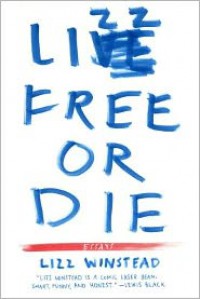
I don't normally read memoirs, but this title caught my eye. Not life altering, but an enjoyable read. I laughed out loud, I cried, I laughed while crying. This is a book written by a comedian, afterall. If you are not a liberal, you will probably not enjoy this book. But if you get your news from The Daily Show, read on.
Sophomore slump? The Absent One (Department Q #2)

I really enjoyed the first in this series,
But while I found this book a bit disappointing, it wasn't without enjoyments. Department Q is growing, and causing more problems to the higher ups. Assad, with a diminished role here, continues to be interesting and, perhaps, even more mysterious. There are hints that we will eventually get to explore the mystery of what happened to Morck and his partners. Rose, the department's newest member, is sadly under-developed, but promising. And the relationships in Morck's life continue to humanize him. I just wish the book had stayed with these folks and spent less time with the villains. For one, I don't really need, or want to see the crime as it happens, and two, time spent with them means less development of the characters I do care about and have become invested with.
I will keep on with at least the next book in the series.
A fun reason to dig into a Classic you've been avoiding.
There is never enough time to read all the books I want to read and it's always a challenge to pick the next book. Should I read just for fun or should I challenge myself a little more? Genre? Non-fiction? Something new or a classic? I took the easy way out recently and decided to re-read a fun book, Jasper Fforde's The Eyre Affair. I read this when it first came out and remembered enjoying it. But a short way into it this time it occurred to me that I would probably enjoy it all the more if I'd actually read Jane Eyre. So I took a long intermission, and finally did it.
And it wasn't all that painful. I've studiously avoided chick-lit my entire life. When classmate were reading Laura Ingals Wilder, I was reading Jack London. Jane is a pretty plucky heroine through most of the book. It does end with her finding her ultimate fulfillment in marrying her man, which works as a romance, but feels like a bit of a sell out. Yeah, Rochester is the better lover, but St. John wasn't entirely wrong is his assessment of her character.
When I got back to Thursday Next, it was much more enjoyable. And much less like watching Rosenkrantz and Guildenstern are Dead without knowing Hamlet. Having a reason to read Jane Eyre, other than "I should" kept me at it and paying closer attention that it would likely have done otherwise. I didn't know which bits I might need to remember. So, kinda like a school assignment, but much more frivolous and fun.
Nine Coaches Waiting (Rediscovered Classics)
 I hadn't read Mary Stewart since the Merlin trilogy in junior high. This isn't terribly suspenseful,and would be mostly just a guilty pleasure were it not for the prose. Elegantly crafted and evocative writing. Smooth and rich as cocoa. A pleasure indeed.
I hadn't read Mary Stewart since the Merlin trilogy in junior high. This isn't terribly suspenseful,and would be mostly just a guilty pleasure were it not for the prose. Elegantly crafted and evocative writing. Smooth and rich as cocoa. A pleasure indeed.
52 Loaves: One Man's Relentless Pursuit of Truth, Meaning, and a Perfect Crust
 Having recently developed my own slightly demented passion for making bread, I found a kindred spirit. Informative and often laugh out loud funny, I enjoyed sharing the road with him on our individual quixotic quests for the "perfect" loaf of bread.
Having recently developed my own slightly demented passion for making bread, I found a kindred spirit. Informative and often laugh out loud funny, I enjoyed sharing the road with him on our individual quixotic quests for the "perfect" loaf of bread.
The Rook: A Novel
 A fun romp. Engaging story, great lead character(s), and a wonderfully crass sense of humor. More please!
A fun romp. Engaging story, great lead character(s), and a wonderfully crass sense of humor. More please!
Speaking From Among the Bones: A Flavia de Luce Novel
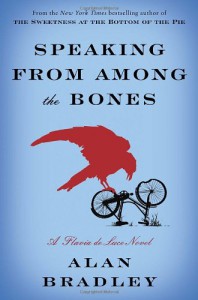 I love these books and this was no exception. I can't wait to see what Flavia will do next. And especially at the end of this one. "Can I have some more, please?"
I love these books and this was no exception. I can't wait to see what Flavia will do next. And especially at the end of this one. "Can I have some more, please?"
The Bread Bible
 I've gotten frustrated not being able to find my favorite breads when I want them, so I've decided to make my own. Having made bread with my mother 30 years ago, I remembered many of the frustrations and having no solutions. This book is an excellent guide.The instructions are absolutely specific. She has separate instructions for using a bread machine, a stand mixer or kneading by hand. While this means the recipes cover multiple pages, if I follow them exactly, I will have success. I've made her ciabatta twice now. The first was to die for; to slather it in butter or dip it in oil would have been a crime. The second is just as delicious but even airier than the first. I'm in heaven. If you want to learn the craft of bread making, this is an excellent guide. The batches are small, which makes them manageable and encourages continued play. Her instructions are clear although the wordiness makes you want to skip them. Don't do it. Read the recipe through from beginning to end at least once before you start. I've only been at this for three weeks, but I'm well on my way to becoming the bread baker I want to be.
I've gotten frustrated not being able to find my favorite breads when I want them, so I've decided to make my own. Having made bread with my mother 30 years ago, I remembered many of the frustrations and having no solutions. This book is an excellent guide.The instructions are absolutely specific. She has separate instructions for using a bread machine, a stand mixer or kneading by hand. While this means the recipes cover multiple pages, if I follow them exactly, I will have success. I've made her ciabatta twice now. The first was to die for; to slather it in butter or dip it in oil would have been a crime. The second is just as delicious but even airier than the first. I'm in heaven. If you want to learn the craft of bread making, this is an excellent guide. The batches are small, which makes them manageable and encourages continued play. Her instructions are clear although the wordiness makes you want to skip them. Don't do it. Read the recipe through from beginning to end at least once before you start. I've only been at this for three weeks, but I'm well on my way to becoming the bread baker I want to be.
The Bread Baker's Apprentice: Mastering the Art of Extraordinary Bread
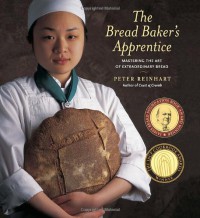 While I am learning a tremendous amount from this book, it isn't quite enough if you are just starting out in your bread baking adventures. As I've been working through the recipes, I've often wished for a master baker standing over my shoulder to clarify a technique, or to point out just exactly what the dough should look and feel like *here*. He does a great job of explaining many of the whys but leaves the *exactly what* a bit shaky. While I've yet to have any of the breads from these recipes fail completely, success has been a bit mixed. I've switched to working from The Bread Bible by Beranbaum, and after a half dozen loaves from that I've gained enough confidence to begin to return to this one. I think after a few more months working studiously with both, I'll be able to bake whatever bread I desire, from a work-a-day whole wheat sandwich loaf to sourdough sub rolls to baguettes and ciabattas that could compete with any bakery anywhere. I have one other negative in that the recipes are twice as large as I would like. Once I've nailed the techniques, then the amounts will be fine. But in the learning stage, half as much is better. I probably should say that I am a bread nut and am looking for perfection. I have yet to bake bread from this book that isn't better than grocery store bakery bread.
While I am learning a tremendous amount from this book, it isn't quite enough if you are just starting out in your bread baking adventures. As I've been working through the recipes, I've often wished for a master baker standing over my shoulder to clarify a technique, or to point out just exactly what the dough should look and feel like *here*. He does a great job of explaining many of the whys but leaves the *exactly what* a bit shaky. While I've yet to have any of the breads from these recipes fail completely, success has been a bit mixed. I've switched to working from The Bread Bible by Beranbaum, and after a half dozen loaves from that I've gained enough confidence to begin to return to this one. I think after a few more months working studiously with both, I'll be able to bake whatever bread I desire, from a work-a-day whole wheat sandwich loaf to sourdough sub rolls to baguettes and ciabattas that could compete with any bakery anywhere. I have one other negative in that the recipes are twice as large as I would like. Once I've nailed the techniques, then the amounts will be fine. But in the learning stage, half as much is better. I probably should say that I am a bread nut and am looking for perfection. I have yet to bake bread from this book that isn't better than grocery store bakery bread.
The Bards of Bone Plain
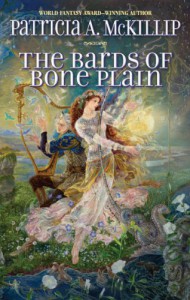 Enjoyable as she always is, but this one felt incomplete. Her books, post-Riddlemaster, have spoken to me of deeper meanings, not strictly allegory, but more using myth to explore this life. I don't mind working a little harder to find it, but I seem to have missed it completely with this one. I did enjoy the tri-partite structure of the book: Flashback, Present and scholarly paper written in the present about the events of the flashback. This kind of experimentation in the structure of a novel has always appealed to me. But perhaps, in this case, the experimentation took over from telling either the story or the deeper one. Still diverting and enjoyable, just not one of her best.
Enjoyable as she always is, but this one felt incomplete. Her books, post-Riddlemaster, have spoken to me of deeper meanings, not strictly allegory, but more using myth to explore this life. I don't mind working a little harder to find it, but I seem to have missed it completely with this one. I did enjoy the tri-partite structure of the book: Flashback, Present and scholarly paper written in the present about the events of the flashback. This kind of experimentation in the structure of a novel has always appealed to me. But perhaps, in this case, the experimentation took over from telling either the story or the deeper one. Still diverting and enjoyable, just not one of her best.
King Solomon's Mines (Modern Library Classics)
 I really wanted to like this book knowing what a seminal place it has in fantasy/adventure. Yes, the book is a product of its time, but that excuse is just that. Huckleberry Finn is also a product of its time and an excellent book besides. This book is racist, sexist, and an environmental disaster. Overlook that and you get gaping plot holes and prose that ranges from natural to outrageously stilted. There's a halfway decent adventure story in there, but it's a slog getting through it.
I really wanted to like this book knowing what a seminal place it has in fantasy/adventure. Yes, the book is a product of its time, but that excuse is just that. Huckleberry Finn is also a product of its time and an excellent book besides. This book is racist, sexist, and an environmental disaster. Overlook that and you get gaping plot holes and prose that ranges from natural to outrageously stilted. There's a halfway decent adventure story in there, but it's a slog getting through it.





 1
1



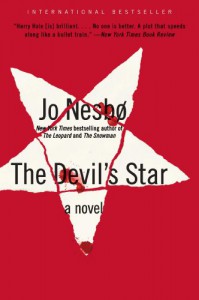
 1
1